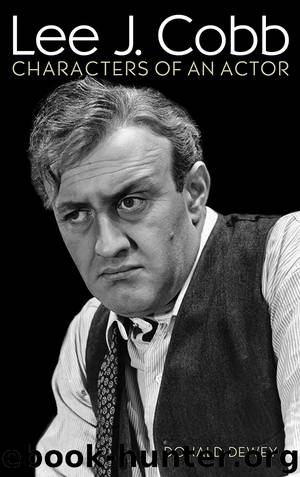Lee J. Cobb by Donald Dewey

Author:Donald Dewey [Dewey, Donald]
Language: eng
Format: epub
Publisher: Rowman & Littlefield Publishers
Published: 2014-02-27T16:00:00+00:00
Chapter 16
Going Door to Door
Willy Loman would have been familiar with Cobb’s trudging from one dim prospect to another at the dawn of the 1950s. Even at rumor level there were scant indications of a major Hollywood opportunity following his Broadway triumph in Death of a Salesman. Initially, this wasn’t due only to studio wariness about hiring him because of his politics. Having pulled out of Salesman in November 1949 “on the advice of his physician,”1 and notwithstanding Kazan’s skepticism, he gratefully embraced a few months of rest in a new home in Beverly Hills. It wasn’t until April 1950 that his name was tied to a specific project, one in which he not only would have starred but also made his debut as a film director. But even that undertaking, a crime drama entitled No Tomorrow and with a plot that sounded a lot like The Dark Past, would have been under the aegis of B-level producer Sam Wiesenthal.2 No Tomorrow turned out to be aptly named; instead, Cobb’s first engagement after Salesman was an equally modest melodrama entitled The Man Who Cheated Himself and in which he only acted. His consolation prize was that it was the first feature in which he received top billing.
The actor tried to win from publicity interviews for the picture what he couldn’t get from what was on the screen. A drab-looking exercise directed by Felix E. Feist, The Man Who Cheated Himself cast Cobb as a police detective who helps a seductive wife cover up the supposedly accidental shooting of her husband and who then futilely tries to keep his younger brother, also a detective, from pursuing clues suggesting premeditated murder. As hinted at by the title, Cobb’s cop is the last one to realize how he has been ensnared by the wife. While most critics were noting that Jane Wyatt was critically miscast as the siren and that John Dall as the younger brother had the wrong vowel in his surname, Cobb took the opportunity of meetings with the press to make it clear he would have been happier with No Tomorrow or any other project that would have initiated him as a director. Without reference to Feist, whose major credits to that point had been for short subjects, Cobb told one interviewer,
A director’s is the most rewarding job in this medium. I have ideas—ideas that I hope and believe will be fresh. For one thing, you always hear people putting emphasis on the director “who knows what he wants.” This is intended as high praise. But it’s only half the point. How does he get the actor to know what he wants? Is he able to appeal to the actor in a way the actor responds to his purpose? I may be wrong, but I believe I’d have a good avenue of communication with other actors, to establish the proper empathy with them.3
The want ad went unanswered: he never did get an official credit as a motion picture director.
Download
This site does not store any files on its server. We only index and link to content provided by other sites. Please contact the content providers to delete copyright contents if any and email us, we'll remove relevant links or contents immediately.
Call Me by Your Name by André Aciman(20521)
Ready Player One by Cline Ernest(14679)
How to Be a Bawse: A Guide to Conquering Life by Lilly Singh(7489)
Wiseguy by Nicholas Pileggi(5791)
The Kite Runner by Khaled Hosseini(5183)
On Writing A Memoir of the Craft by Stephen King(4947)
Audition by Ryu Murakami(4933)
The Crown by Robert Lacey(4818)
Call me by your name by Andre Aciman(4691)
Gerald's Game by Stephen King(4656)
Harry Potter and the Cursed Child: The Journey by Harry Potter Theatrical Productions(4507)
Dialogue by Robert McKee(4406)
The Perils of Being Moderately Famous by Soha Ali Khan(4221)
Dynamic Alignment Through Imagery by Eric Franklin(4218)
Apollo 8 by Jeffrey Kluger(3713)
The Inner Game of Tennis by W. Timothy Gallwey(3689)
Seriously... I'm Kidding by Ellen DeGeneres(3637)
How to be Champion: My Autobiography by Sarah Millican(3594)
Darker by E L James(3520)
